六年级英语复习提纲
六年级英语复习u1-u6四会词句提纲

六年级上册四会词句复习提纲Class ____ Name _____ No.Unit 11.科学2. 博物馆3. 右4. 书店5. 电影院6. 医院7. 十字路口8. 转弯9.左10. 邮局_____ 11.直行___12. 博物馆商店13. 附近,旁边14. 接近,在…的旁边_______ 15. 谁16. 哪里17. 什么18. 如何_______ 19. 何时20.笔直地____________ 21.左转________________ 22.右转______________ 23.到达_______ 24. 在左边____________ 25. 在右边______________1. 博物馆的商店在哪儿?_______________________2. 在大门附近。
______________1.我们怎么到那儿?_____________________2.到书店左转。
________________订正_____________________________________________________________________________ _____________________________________________________________________________ _____________________________________________________________________________Unit 21.步行_____2. 乘、坐3. 公共汽车4. 飞机5.出租车____6.船7. 地铁8. 火车9. 慢下来_______ __ 10. 停下11. 等待12. 通常________ 13.慢的________ 14.减少,降低_________ 15.头盔____________ 16.人们__________ 17.必须__________ 18.戴________ 19.注意__________ _____________________20.交通__________ 21.交通信号灯______________________1. 你怎么来学校的?____________________通常我走路来。
六年级英语复习提纲
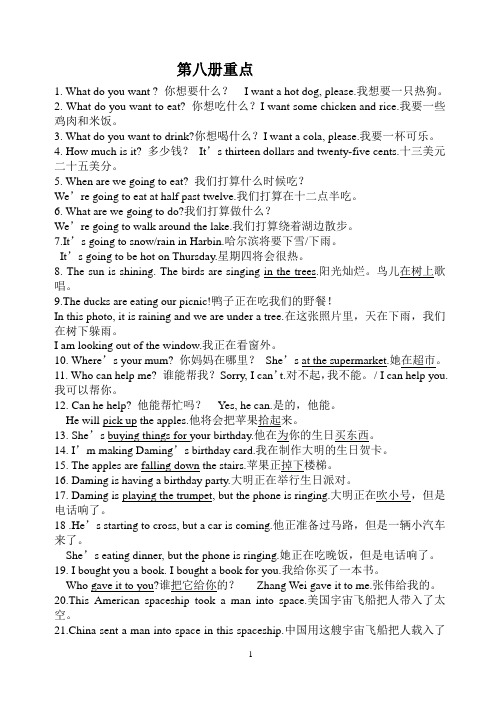
第八册重点1. What do you want ? 你想要什么?I want a hot dog, please.我想要一只热狗。
2. What do you want to eat? 你想吃什么?I want some chicken and rice.我要一些鸡肉和米饭。
3. What do you want to drink?你想喝什么?I want a cola, please.我要一杯可乐。
4. How much is it? 多少钱?It’s thirteen dollars and twenty-five cents.十三美元二十五美分。
5. When are we going to eat? 我们打算什么时候吃?We’re going to eat at half past twelve.我们打算在十二点半吃。
6. What are we going to do?我们打算做什么?We’re going to walk around the lake.我们打算绕着湖边散步。
7.It’s going to snow/rain in Harbin.哈尔滨将要下雪/下雨。
It’s going to be hot on Thursday.星期四将会很热。
8. The sun is shining. The birds are singing in the trees.阳光灿烂。
鸟儿在树上歌唱。
9.The ducks are eating our picnic!鸭子正在吃我们的野餐!In this photo, it is raining and we are under a tree.在这张照片里,天在下雨,我们在树下躲雨。
I am looking out of the window.我正在看窗外。
10. Where’s your mum? 你妈妈在哪里?She’s at the supermarket.她在超市。
六年级英语复习提纲 文档

六年级英语复习提纲单词1.汉堡2.可乐3.美元4.美分5.享用6.鸭子7.吵闹的8.照耀9每个人10往外11错误的12卡片13小心的14气球15飘走16楼梯17混乱18小号19响20.门铃21大声的22棒球23队、组24 宇宙飞船25太空词组互译1.进行野餐have a picnic2.12点半half past twelve3.沿着湖边散步walk around the lake4.在这张照片上in this phone5.往窗外看look out of the widow 6生日贺卡a birthday card7小心be careful 8飞走fly away 9 捡起来pick up10 进来come in 12吹小号play the trumpet 13 开始下雨start to lrain 14 这本关于美国的书this book about America 15一个棒球队 a baseball team 16 把它给你give it to you 17.和她的朋友说话Talk to her friend 18大声地唱sing very loudly 19走向黑板walk to the blackboard. 20.上山go up a hill 21.戴着一定大帽子wear a big hat 22.发送一些照片send some photos按要求变换词形1trumpet (复数) trumpets 2.sad (反义词) happy 3.that(复数)those3.fish(复数)fish4.rain(形容词)rainy5.party(复数)parties6.loudly(形容词) loud 7noise(形容词)noisy 8.let’s(完全形式)let’s e(三单形式) 10.say(三单形式)写出下列动词的过去式1.ride-----rode2.eat----ate3.play----played4.is----was5.drink---drank6.see---saw7.watch---watched8.go---went9win---won 10.buy—bought 11.send—sent 12take -- took写出下列动词的现在分词1.shine -----2.buy -----3.get ------4.ride----5.start----6.have----7.stop----8.ring----选择正确的答语,并将标号写在()中( )1.Who can help me ? A It’s twelve.( )2.Is it really a dog ? B No, I don’t.( ) 3.Here you are. C Sorry, Mum.( )4.Let’s go under that tree. D Yes, it is.( )5.What time is it? E Yes,it is.( )6.Can I have this cap? F No, it isn’t.( )7.Where’s your grandma? G That’s okay.( )8Do you talk about the photos? H I can help you.( )9.IS it going to rain soon? I I can help you.( )10.Are you flying in the sky? J Thank you.按要求完成句子1.our are The picnic eating ducks (连词成句)2.This Chinese spaceship took a man into space.(翻译成中文)3.They rode bicycles yesterday.(变成一般疑问句,并作肯定回答04.I can carry this bag. .( 变成否定句)5.We’re going to eat at half past twelve.(对划线部分提问)6.It’s about animals.(对划线部分提问)7.You are waving (say) goodbye.8.Daming (have) a great birthday!9.We are looking at sone ducks.(对划线部分提问)10.What’s this, Daming? It’s playing baseball.11.He’s starting to cross, a car is coming.12. a mess!13.I’m going to have a party. (变一般疑问句,并作肯定回答)14.Pigs are sleeping under the tree.(对划线部分提问)15.It’s going to (sunny)on Thursday.16.It’s going to (rain)on Sunday.翻译句子1.我想要一个热狗,请给我来一个。
六年级英语总复习提纲(打印给学生)
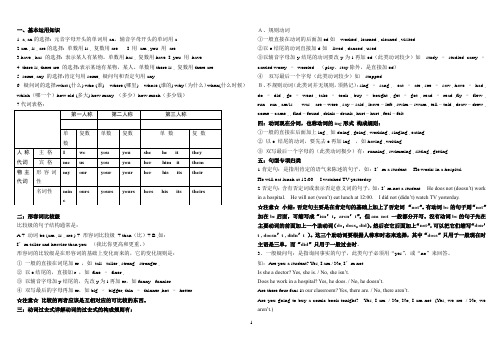
一、基本运用知识1. a, an的选择: 元音字母开头的单词用an,辅音字母开头的单词用a.2 am , is , are的选择: 单数用is , 复数用are. I 用am , you 用are.3 have , has 的选择: 表示某人有某物。
单数用has , 复数用have. I ,you 用have .4. there is, there are 的选择:表示某地有某物,某人。
单数用there is , 复数用there are.5. some, any 的选择:肯定句用some, 疑问句和否定句用any.6. 疑问词的选择:what (什么) who (谁) where (哪里) whose (谁的) why(为什么)when(什么时候)which(哪一个)how old (多大) how many (多少)how much(多少钱)7.代词表格:二:形容词比较级比较级的句子结构通常是:A + 动词be (am , is , are ) + 形容词比较级+ than(比)+B ,如:I’m taller and heavier than you. (我比你更高和更重。
)形容词的比较级是在形容词的基础上变化而来的,它的变化规则是:①一般的直接在词尾加er ,如tall - taller , strong - stronger ,②以e结尾的,直接加r ,如fine –finer ,③以辅音字母加y结尾的,先改y为i再加er,如funny - funnier④双写最后的字母再加er,如big –bigger, thin –thinner ,hot –hotter☆注意☆比较的两者应该是互相对应的可比较的东西。
三:动词过去式详解动词的过去式的构成规则有:A、规则动词①一般直接在动词的后面加ed如worked , learned , cleaned , visited②以e结尾的动词直接加d如lived , danced , used③以辅音字母加y结尾的动词要改y为i再加ed(此类动词较少)如study –studied carry –carried worry –worried (play、stay除外,是直接加ed)④双写最后一个字母(此类动词较少)如stoppedB、不规则动词(此类词并无规则,须熟记):sing –sang , eat –ate , see –saw , have –had , do –did , go –went , take –took , buy –bought , get –got , read –read ,fly –flew , run-- ran , am/is-----was are – were , say – said , leave – left , swim – swam , tell – told , draw – drew , come – came , , find – found , drink – drank , hurt – hurt , feel – felt四:动词现在分词,也称动词的ing形式构成规则:①一般的直接在后面加上ing , 如doing , going , working , singing , eating②以e 结尾的动词,要先去e再加ing,如having , writing③双写最后一个字母的(此类动词极少)有:running , swimming , sitting , getting五:句型专项归类1.肯定句:是指用肯定的语气来陈述的句子,如:I’m a student. He works in a hospital.He will eat lunch at 12:00. I watched TV yesterday .2.否定句:含有否定词或表示否定意义词的句子,如:I’m not a student. He does not (doesn’t) work in a hospital. He will not (won’t) eat lunch at 12:00. I did not (didn’t) watch TV yesterday.☆注意☆小结:否定句主要是在肯定句的基础上加上了否定词“not”。
六年级英语复习提纲
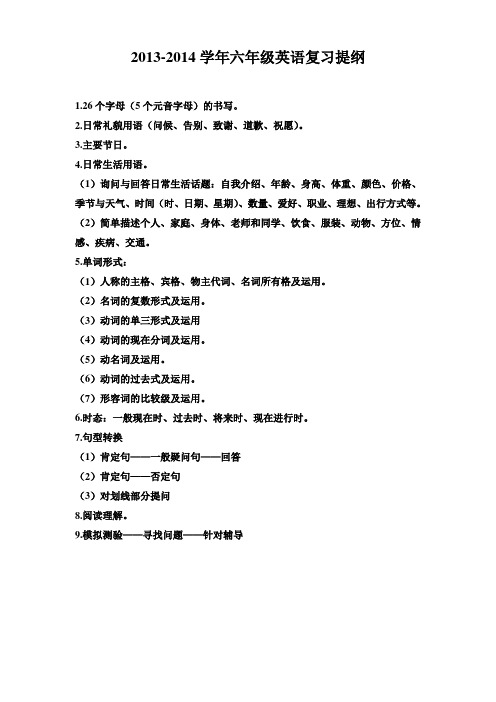
2013-2014学年六年级英语复习提纲
1.26个字母(5个元音字母)的书写。
2.日常礼貌用语(问候、告别、致谢、道歉、祝愿)。
3.主要节日。
4.日常生活用语。
(1)询问与回答日常生活话题:自我介绍、年龄、身高、体重、颜色、价格、季节与天气、时间(时、日期、星期)、数量、爱好、职业、理想、出行方式等。
(2)简单描述个人、家庭、身体、老师和同学、饮食、服装、动物、方位、情感、疾病、交通。
5.单词形式:
(1)人称的主格、宾格、物主代词、名词所有格及运用。
(2)名词的复数形式及运用。
(3)动词的单三形式及运用
(4)动词的现在分词及运用。
(5)动名词及运用。
(6)动词的过去式及运用。
(7)形容词的比较级及运用。
6.时态:一般现在时、过去时、将来时、现在进行时。
7.句型转换
(1)肯定句——一般疑问句——回答
(2)肯定句——否定句
(3)对划线部分提问
8.阅读理解。
9.模拟测验——寻找问题——针对辅导。
六年级英语知识点提纲
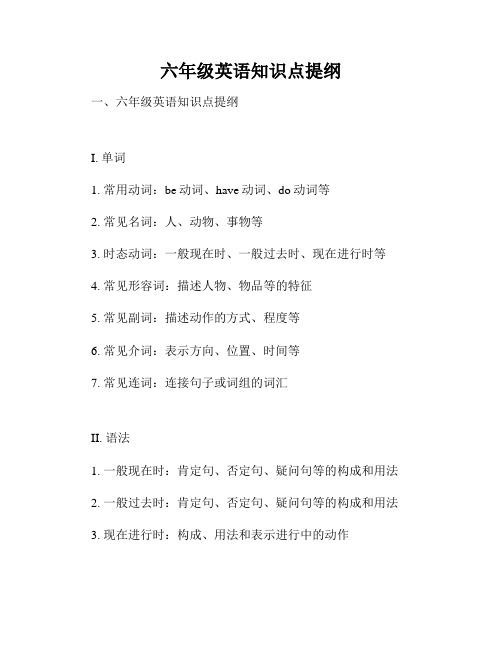
六年级英语知识点提纲一、六年级英语知识点提纲I. 单词1. 常用动词:be动词、have动词、do动词等2. 常见名词:人、动物、事物等3. 时态动词:一般现在时、一般过去时、现在进行时等4. 常见形容词:描述人物、物品等的特征5. 常见副词:描述动作的方式、程度等6. 常见介词:表示方向、位置、时间等7. 常见连词:连接句子或词组的词汇II. 语法1. 一般现在时:肯定句、否定句、疑问句等的构成和用法2. 一般过去时:肯定句、否定句、疑问句等的构成和用法3. 现在进行时:构成、用法和表示进行中的动作4. 比较级和最高级:形容词的比较级和最高级形式的构成和用法5. 名词所有格:表示所有关系的名词的构成和用法6. 介词短语:表示时间、地点、原因等的介词短语的使用7. 人称代词:主格和宾格的用法及其在句子中的作用III. 句型1. There be句型:表示事物存在的句型构成和用法2. 简单句:主语+谓语+宾语的句子构成3. 并列句:两个或多个简单句并列构成的句子4. 复合句:主句和从句构成的句子IV. 阅读理解1. 短文阅读:理解短文的主旨、大意以及具体细节2. 根据短文回答问题:根据短文内容回答问题3. 补全对话:根据对话的语境选择正确的选项V. 写作1. 句子写作:根据所学的语法知识编写正确的句子2. 简单段落写作:组织句子和观点,写一段简短的小作文VI. 听力1. 听力材料:听懂日常对话和简短故事2. 根据听到的内容回答问题:根据听到的对话或短文回答问题3. 听写:听写所听到的单词、句子或短文VII.口语1. 日常用语:问候、道歉、感谢、请求等常用表达方式2. 简单对话:根据给定情境进行简单的日常对话练习以上是六年级英语的知识点提纲,通过学习以上内容,能够更好地掌握英语的基础知识,提高听说读写能力。
请学生们按照教师的指导和布置的任务进行学习和练习,以便更好地应对即将到来的考试和实际运用中遇到的问题。
六年级英语复习提纲

六年级英语复习提纲Be(am is are )---过去式am is—was are—were特殊疑问词还有很多where how which what time how long how much how many…, 需要同学们在学习中发现和积累。
四种时态一、一般现在时通常在句中含有usually often sometimes always等频度副词。
句尾可能有every单词,表示事情经常性发生。
动词形式有第三人称单数和其他人称的区别。
1、陈述句例如:I often read books. He often reads books.2、一般疑问句例如:Do you often read books? Does he often read books?肯定回答:Y es, I do. Y es, he does.否定回答:No, I don’t. No, he doesn’t.3、特殊疑问句例如:What do you often do? What does he often do?用上面陈述句回答。
二、正在进行时表示正在做的动作或事情。
句尾一般有now. 陈述句式为人称代词+be+动词的ing形式1、陈述句例如:I am reading books now.2、一般疑问句例如:Are you reading books now?肯定回答:Y es, I am. 否定回答:No, I’m not.3、特殊疑问句例如:What are you doing now?用上面陈述句回答。
三、一般将来时表示将要做的事。
句尾一般有next…tomorrow 陈述句式为人称代词+be going to+动词原形或he will+动词原形(I shall+动词原形)1、陈述句例如:I am going to read books next weekend.2、一般疑问句例如:Are you going to read books next weekend?肯定回答:Y es, I am. 否定回答:No, I’m not.3、特殊疑问句例如:What are you going to do next weekend?用上面陈述句回答。
六年级小学英语复习提纲
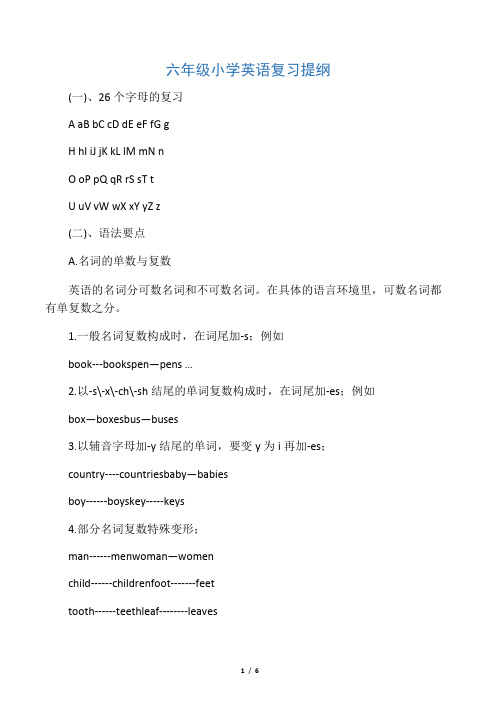
六年级小学英语复习提纲(一)、26个字母的复习A aB bC cD dE eF fG gH hI iJ jK kL lM mN nO oP pQ qR rS sT tU uV vW wX xY yZ z(二)、语法要点A.名词的单数与复数英语的名词分可数名词和不可数名词。
在具体的语言环境里,可数名词都有单复数之分。
1.一般名词复数构成时,在词尾加-s;例如book---bookspen—pens …2.以-s\-x\-ch\-sh结尾的单词复数构成时,在词尾加-es;例如box—boxesbus—buses3.以辅音字母加-y结尾的单词,要变y为i再加-es;country----countriesbaby—babiesboy------boyskey-----keys4.部分名词复数特殊变形;man------menwoman—womenchild------childrenfoot-------feettooth------teethleaf--------leavesknife-------knivespeople—peoplesheep----sheepfish------fish…B.主谓一致在英语句子中,谓语动词要随着主语人称和数的变化而发生相应的变化,请做如下练习:①I ___ (am/is/are) a student.②She ____ (want/wants) to go to the park.③Li Ming ___ (like/likes) T-shirt, but I ____ (like/likes) sweater.④There ____ (am/is/are) some muscles in your arm.⑤Amy _____ (eat/eats) noodles everyday.C.动词的现在分词及其构成规则1.一般情况下,在动词末尾直接加—ing;如walk—walkingread—reading2.末尾以元音字母“e”结尾的单词,要去掉字母“e”,再加--ing;如write—writinginvite—inviting3.重读闭音节单词,末尾只有一个辅音字母的,要双写末尾的辅音字母,再加—ing.例如:get—gettingsit—sittingput—puttingswim—swimming4.特殊变形lie---lying…D.动词的过去时:动词的一般过去时态表示过去发生的动作、情况或存在的状态。
六年级英语复习提纲

一、基础语法1.一般现在时的用法:表示习惯、经常性动作等。
2.一般过去时的用法:表示过去一些时间发生的动作或状态。
3.一般将来时的用法:表示将来一些时间要发生的动作或状态。
4.现在进行时的用法:表示现在正在进行的动作或状态。
5.现在完成时的用法:表示过去发生的动作对现在造成的影响。
6. 情态动词can, could, may, might的用法:表示能力、可能性等。
7.形容词和副词的比较级和最高级的构成和用法。
8.一般疑问句和特殊疑问句的转换和回答方式。
9.直接引语和间接引语的转换。
二、词汇1.常见动词、名词、形容词、副词和介词的拼写和用法。
2.常见频率副词、序数词和形容词的构成和用法。
3.常见表示时间、地点、方位和原因等的介词的用法。
4.常见表示家庭成员、职业、国籍、爱好等的单词的用法。
5.常见表示行为习惯、天气、表达意愿等的短语和句子的用法。
三、阅读理解1.阅读短文,根据问题选择正确答案。
2.阅读短文,根据短文内容完成句子或问题。
四、写作1.描写人物:外貌特征、性格特点、爱好等。
2.描述地点:位置、大小、设施等。
3.书面表达:假设一些人物或事物,根据提示写一篇短文。
五、听力1.听录音,选择正确的图片。
2.听录音,根据问题选择正确答案。
3.听短文,填写所缺的单词。
六、口语交际1.日常用语:问候、感谢、道歉等。
2.接受或拒绝邀请。
3.询问和提供帮助。
以上为六年级英语复习的提纲,希望对您的复习有所帮助。
请根据自己的实际情况,做适当的调整和拓展。
祝您学习进步!。
人教版六年级英语上册复习提纲Unit 4-Unit 6

六年级上学期英语复习提纲Unit4—Unit6Unit4Accident一、基础词汇am/is-was are-were have-had break-broke go-went cut-cut put-put find-found come-came see-saw fall-fell accident事故safe安全的pad软垫belt安全带bottle瓶子matter问题deep深的village村庄keep to遵守...take care当心put away拿走...hospital医院left左边的right右边的arm手臂leg腿bandage绷带broken破碎的二、基本句型1.When I was...I had an accident with...当我......岁.....时我遇到了一场事故。
2.I/He/She broke my/his/her...我/他/她摔破了我的/他的/她的......3.-Did...have an accident when...was/were...?谁......岁时有过一场事故吗?-Yes,...did./No,...didn’t.是的。
/不是。
4.-What’s the matter with you?你怎么啦?-My...hurts.我的......疼。
5.Don’t forget.../Please remember...不要忘记……/请记住……。
三、基础语篇1.When I was eight,I had an accident with my bike.I broke my leg and my right arm.I was in hospital for four weeks.当我八岁时,我骑自行车时发生了一场事故。
我摔破了我的腿和我的右胳膊。
我在医院里呆了四个星期。
st year Joseph was on holiday with his parents.One day he went swimming.He cut his foot ona broken bottle.His mum put a bandage round it.去年Joseph和他的父母外出度假。
小学六年级英语下册期末复习提纲

小学六年级英语下册期末复习提纲1. 词汇复- 复并掌握本学期所学的所有单词,包括拼写、读音和词义。
2. 语法复- 复句子结构,包括主语、谓语、宾语、定语和状语的用法。
- 复时态的使用,包括一般现在时、一般过去时和一般将来时。
- 复形容词和副词的比较级和最高级的构成和用法。
3. 句型练- 复肯定句、否定句、疑问句的构成和回答方式。
- 复一般疑问句和特殊疑问句的语序和构成。
4. 阅读理解- 阅读并理解本学期所学的故事和文章,回答相关问题。
- 提高阅读速度和理解能力,注重理解文章的主题、细节和推理。
5. 写作练- 练书写正确的英文字母和单词,注意大小写和造句的准确性。
- 练写短文,表达自己的观点、描述人物和事件等。
6. 口语训练- 练口语表达,包括日常交流用语、询问和回答问题等。
- 练听说对话,提高听力和口语理解能力。
7. 朗读练- 练正确的发音和语调,提升朗读表达能力。
- 练流利朗读短文和故事,注意语音语调和语速。
8. 听力训练- 练听力理解,包括听单词、短语和句子等的听写和理解。
- 练听懂故事、对话和问题等,提高听力技巧和反应能力。
9. 语言运用- 综合运用所学语言知识,进行口语和书面的实际应用练。
- 练解决实际的交际问题,如购物、旅行、问路等。
10. 自主研究- 建立良好的研究惯,自主复所学知识。
- 多做练题,查漏补缺,积累知识。
以上是小学六年级英语下册期末复习的提纲,按照提纲进行有针对性的复习,相信你会取得好成绩!加油!。
英语六年级知识点提纲

英语六年级知识点提纲一、词汇1. 掌握常用的单词及其用法,包括名词、动词、形容词和副词等。
2. 学习常见的短语和习惯用法,如问候语、道别语、表示感谢等。
3. 理解并正确使用基本的英语词汇词性变化规则,如单数变复数、动词的时态变化等。
二、语法1. 学习基本的句型结构,包括主语+谓语、名词性从句、形容词性从句等。
2. 熟悉常见的英语句子成分,如主语、谓语、宾语、定语和状语等。
3. 掌握基本的时态和语态,如一般现在时、一般过去时、现在进行时、被动语态等。
三、阅读1. 提高阅读理解能力,通过阅读短文、故事和文章来理解并回答相关问题。
2. 发展阅读技巧,如预测、推理、判断和归纳等。
3. 学习阅读速度和流利度,提高对长篇文章的理解能力。
四、听力1. 完成听力理解任务,包括听取句子并判断正误、听取对话回答问题等。
2. 提高听力技巧,如注意听关键信息、提前预测等。
3. 培养对不同语速和口音的听力适应能力。
五、口语1. 培养口头表达能力,能够用简单的句子进行对话和交流。
2. 学习常见的口语表达方式,如问路、购物、订餐等。
3. 提高发音准确性和语调的自然程度,尽量模仿母语者的语音语调。
六、写作1. 学习书写正确的字母和单词,并注意大小写的使用。
2. 练习书写简单的句子和段落,描述物品、人物和事件等。
3. 发展写作技巧,如构思、组织、细节描写和过渡等。
七、文化常识1. 了解英语国家的文化习俗,如庆祝节日、传统食物和习惯等。
2. 学习英语国家的地理和历史知识,了解其文化背景。
3. 探究英语和本地语言之间的异同,培养文化包容性。
以上是英语六年级学生需要掌握的主要知识点提纲。
希望学生们能够在学习过程中注重细节,不断积累并提高自己的英语能力。
六年级英语复习提纲1
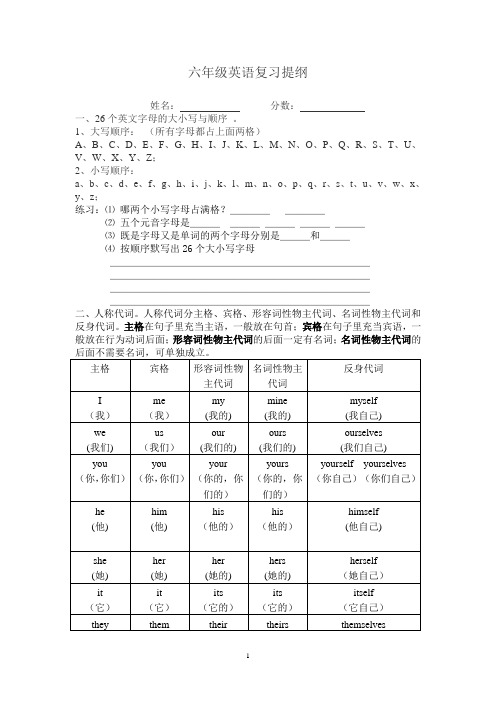
六年级英语复习提纲姓名:分数:一、26个英文字母的大小写与顺序。
1、大写顺序:(所有字母都占上面两格)A、B、C、D、E、F、G、H、I、J、K、L、M、N、O、P、Q、R、S、T、U、V、W、X、Y、Z;2、小写顺序:a、b、c、d、e、f、g、h、i、j、k、l、m、n、o、p、q、r、s、t、u、v、w、x、y、z;练习:⑴哪两个小写字母占满格?________⑵五个元音字母是_______________⑶既是字母又是单词的两个字母分别是___和___⑷按顺序默写出26个大小写字母________________________________________________________________________________________________________二、人称代词。
人称代词分主格、宾格、形容词性物主代词、名词性物主代词和反身代词。
主格在句子里充当主语,一般放在句首;宾格在句子里充当宾语,一般放在行为动词后面;形容词性物主代词的后面一定有名词;名词性物主代词的I1﹑___am a student.___often go to school with___ classmates. 2﹑___English teaches___English.3﹑This is Amy′s skirt.It is not___.he1﹑___ went hiking last weekend.2﹑Give ___ some water.3﹑___ goes to the library___.4﹑___mother is very happy.5﹑Let___open the window. 6﹑Those pens are___.三、三个be动词的用法。
is :主语是单数 am :主语是I are :主语是you和复数练习:用三个be动词填空。
1、The cat___very lovely.2、The cats___very lovely.3、I ___ young.4、You ___ a good boy.5、Chen Jie ___my sister.6、Mike and John ___friends.7、His parents ___works. 8、These books ___new.9、You ___taller than her.10、Sarah′s house ___small.四、句式。
六年级上册英语复习提纲
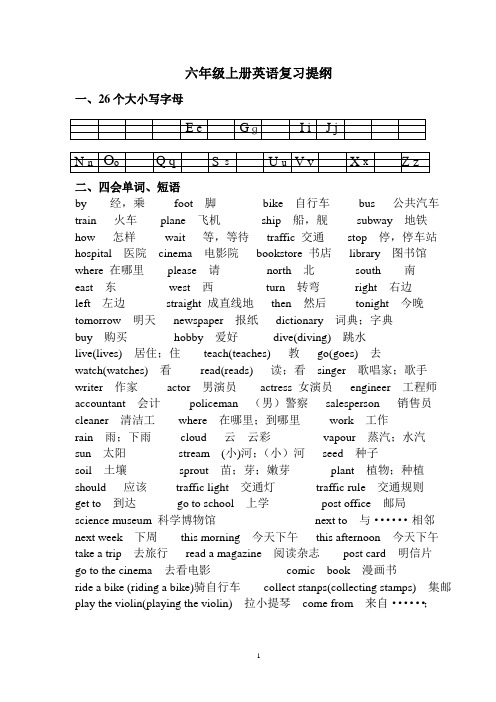
六年级上册英语复习提纲一、26个大小写字母二、四会单词、短语by 经,乘foot 脚bike 自行车bus 公共汽车train 火车plane 飞机ship 船,舰subway 地铁how 怎样wait 等,等待traffic 交通stop 停,停车站hospital 医院cinema 电影院bookstore 书店library 图书馆where 在哪里please 请north 北south 南east 东west 西turn 转弯right 右边left 左边straight 成直线地then 然后tonight 今晚tomorrow 明天newspaper 报纸dictionary 词典;字典buy 购买hobby 爱好dive(diving) 跳水live(lives) 居住;住teach(teaches) 教go(goes) 去watch(watches) 看read(reads) 读;看singer 歌唱家;歌手writer 作家actor 男演员actress 女演员engineer 工程师accountant 会计policeman (男)警察salesperson 销售员cleaner 清洁工where 在哪里;到哪里work 工作rain 雨;下雨cloud 云云彩vapour 蒸汽;水汽sun 太阳stream (小)河;(小)河seed 种子soil 土壤sprout 苗;芽;嫩芽plant 植物;种植should 应该traffic light 交通灯traffic rule 交通规则get to 到达go to school 上学post office 邮局science museum 科学博物馆next to 与······相邻next week 下周this morning 今天下午this afternoon 今天下午take a trip 去旅行read a magazine 阅读杂志post card 明信片go to the cinema 去看电影comic book 漫画书ride a bike (riding a bike)骑自行车collect stanps(collecting stamps) 集邮play the violin(playing the violin) 拉小提琴come from 来自······;make kites(making kites) 制作风筝TV repoter 电视台记者三、根据问题选择正确答语1、How do you go to school?I go to school by bike.(on foot, by bus ···)2、How do you go to Canada(USA)?I go by plane.(by subway ,by train···)3、How can I get to Zhongshan park?You can go by the No.15 bus.4、Is there a cinema near here?Yes,there is.5、Where is the cinema,please?It’s next to the hospital.6、I s it far from here?No,it’s not far.7、Thank you. You’re welcome.8、Can I go on foot?Yes, you can.9、Where is the post office?It’s east of the cinema.10、What are you going to do this evening?I’m going to the cinema.11、What are you going to do on the weekend?I’m going to visit my grandparents this weekend.12、When are you going? This afternoon.13、What are you going to buy?I’m going to buy some comic books(buy a comic book).14、Do you have comic books? Yes! Here they are.15、Where are you going this afternoon?I’m going to the bookstore.16、What is your hobby?I like collecting stamps.(riding,diving ,playing the violin···)17、Does your pen pal live in Shanghai?No,he doesn’t.He lives in Beijing.18、What does your father doi?He’s a teacher.(singer, writer, actor, actress···)19、How does he go to work?He goes to work by bike.20、Where does she work?She works in a car company.21、Where does the rain come from?It comes from the clouds.22、Where does the cloud come from?It comes from the vapour.23、Where does the vapour come from?It comes from the water in the river.24、How can the water become vapour?The sun shines and the water become vapour.25、Where do they live?Their home is next to the science museum.26、What yellow (red, green) light means?Yellow means “wait”.(red means“stop”;green means“go”)四、句型转换。
小学六年级英语复习提纲
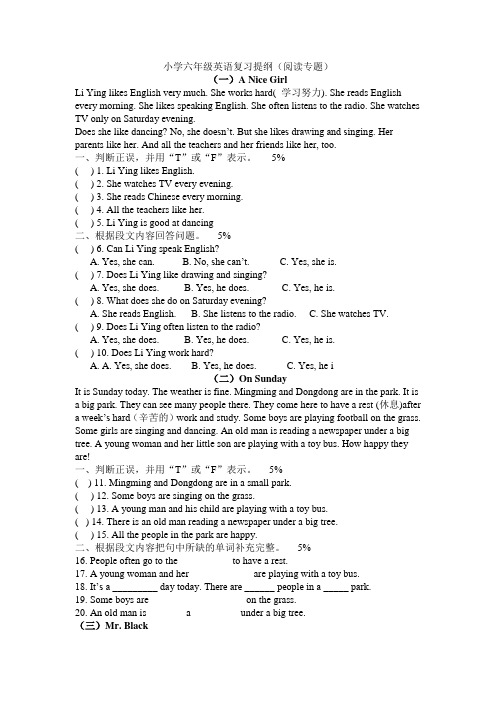
小学六年级英语复习提纲(阅读专题)(一)A Nice GirlLi Ying likes English very much. She works hard( 学习努力). She reads English every morning. She likes speaking English. She often listens to the radio. She watches TV only on Saturday evening.Does she like dancing? No, she do esn’t. But she likes drawing and singing. Her parents like her. And all the teachers and her friends like her, too.一、判断正误,并用“T”或“F”表示。
5%( ) 1. Li Ying likes English.( ) 2. She watches TV every evening.( ) 3. She reads Chinese every morning.( ) 4. All the teachers like her.( ) 5. Li Ying is good at dancing二、根据段文内容回答问题。
5%( ) 6. Can Li Ying speak English?A. Yes, she can.B. No, she can’t.C. Yes, she is.( ) 7. Does Li Ying like drawing and singing?A. Yes, she does.B. Yes, he does.C. Yes, he is.( ) 8. What does she do on Saturday evening?A. She reads English.B. She listens to the radio.C. She watches TV.( ) 9. Does Li Ying often listen to the radio?A. Yes, she does.B. Yes, he does.C. Yes, he is.( ) 10. Does Li Ying work hard?A. A. Yes, she does.B. Yes, he does.C. Yes, he i(二)On SundayIt is Sunday today. The weather is fine. Mingming and Dongdong are in the park. It is a big park. They can see many people there. They come here to have a rest (休息)after a week’s hard(辛苦的)work and study. Some boys are playing football on the grass. Some girls are singing and dancing. An old man is reading a newspaper under a big tree. A young woman and her little son are playing with a toy bus. How happy they are!一、判断正误,并用“T”或“F”表示。
六年级英语复习提纲

六年级英语单元复习提纲Unit 1 When is your birthdayWritten by Sun Ziyu Edited by Ms Liu一:重点词汇月份:一月:二月:三月:四月:五月:六月:七月:八月:九月:十月:十一月:十二月:运用:1. There are 12 m________ in a year. 2. Dragon Boat Festival is in J3. F usually has only twenty-eight days.4. S is the ninth month of a year.5. Mother’s day is the second Sunday of .6. N comes before December.序数词:运用: 1.序数词用在句子中,要在前面加定冠词the2. 变化规则:基数词变序数词口诀基变序,有规律,词尾加上th, 123特殊记,词尾字母t、d、d,“8”加h,“9”去e, f来吧ve替,整十变y为ie, 后面跟th莫迟疑; 想要表达几十几,只变个位就可以;3. Lesson Five= the fifth lesson the second unit =,everybody,please ture to Page and look at the picture.A. Fifth, fiveB. Five, fifth C . Fifth; fifth D. Five; five B5. The two month of a year is February.birthday is on March three7. December is the twelve month of a year.8. We go to school in S二、词组1.生日birthday=date of birthday2.英语测验an English test3学校郊游school trip4举办一个聚会.have a party 5.校庆日School Day 6. 售书会book sale7.一个艺术节an art festival 8. 过的愉快have a good time 9. 在八月份in August9. be busy with +名词忙于某事be busy doing 忙于做某事10. come to来11. 篮球比赛basketball game 12. 本学期this term 13.儿童节Children’s Day14.妇女节:Women’s Day 15. 新年New Year’s Day 16. 国庆节National Day二:重点句型1When is one`s birthdayone`s为名词性或形容词性物主代词It`s+月份+天;注:用it`s回答例:When is your birthday My birthday is January 5th. th.2 in +月份或年份on +天at +时间点例:My father’s birthday is in February, and my mother’s birthday is on March 12th, I want to buy a gift for her, let’s meet at 4:00 this afternoon.3 How old+ be+主语回答:主语+ be+基数词例:He is 40 years old .做…例How about playing play soccer after school5 你们每年都举行校庆活动吗运用:1. My sisterbirthday is on July 5th. 2. Their birthday are in October.3. Her sister is 13 years old.. 对划线部分提问How old is her sister提问年龄用how old4.Mary`s birthday is on June 1st. 对划线部分提问提问日期用when5.The boy is three . Today is his third birthday6.What`s your sister`s age 同义句How old is your sisterNo pains, no gains不劳无获Unit 2 My favorite subject is science.Written by Nie Chenxin Edited by Ms Liu一、单词我知道:1:最喜欢的:favorite 2.科目,学科:subject 科学science 音乐:music 数学math语文:Chinese 地理: geography 历史: history 3.星期,周week 星期一:Monday星期二:Tuesday 星期三:Wednesday 星期四:Thursday 星期五:Friday 星期六:Saturday星期天:Sunday 4. 无聊的boring →有趣的interesting ; 繁忙的busy →空闲的:free ;困难的:difficult →容易的:easy 让人放松的:relaxing , 有用的:useful二、词组世界:1.忙于某事be busy with sth 忙于做某事be busy doing sth2.从...到... From...to3. 完成做某事finish doing4.空闲的:be free5.第二天: the next day6. 上体育课have7. 在星期三on Wednesday8.我最喜欢的科目:9;下课后10. 玩游戏;11.两个小时12. 上一节美术课have an art class三、句型认一认:1. What is your his,her,Tom’s… favorite subject, color, animal, teacher, sports…询问喜好,例句:what is your favorite subject It is … .例句:My favorite subject is English.2. Why do you like …询问原因,例句:Why do you like music Because…例句:Because it is interesting.3. Hi, Bob, how is your day你的每一天过的怎么样OK . so so ,fine , very good…It is on Monday.5. form … to …从…到…, 例句:lunch form ten clock to eleven clock .is your English teacher 例句:My English teacher is Ms. Liu.7. The teacher says it is useful, but I think it’s difficult. 老师说它很有用但我认为它很难;8. It is difficult but interesting. 它很难但是有趣;9. Our Chinese teacher is great fun. 我们的语文老师很风趣;10. My classes finish at 1:50, but after that I have an art lesson for two hours.我在1:50上课结束,但此后我上两个小时的美术课;注:应该变成单三finishes11:every day. 我每天在10:00 上数学课;1 : ‘说”也有深意辨析英语的“说”的表达say + 内容say hellogoodbye,sorry,morning…to sb 向某人说…你好,再见,早上好…tell tell stories 讲故事tell jokes 讲笑话tell sb to do sth 告诉某人做某事talk talk to sb 跟某人说话talk with sb 跟某人交谈talk about sth 谈论某事例:talk about the final exam 谈论期末考试speak +语言speak English 说英语speak Chinese 说汉语2 :‘也’也有深意also在句中,放在be动词,情态动词之前,实意动词之后; 例It is also my birthday.too在句尾,例nice to meet you,too3 “有多少”: how many+可数名词;例How many classes are there in a wee例:I have one uncle . 对划线部分提问------- How many uncles do you have4.l ike…best=favorite相同, 最喜欢......例:My favorite subject is music=I like music best.5.具体哪一天前加on , 具体的时刻前用at例: My birthday is on Monday. Tom has science at 9:50.习题练一练:1What is your subject A . favorite B. like2I best in the riverswim swimming3---Do you like Smith4 A .MRS. B. miss C. Mr. D. Ms.---Yes , she is nice.5we have music Monday. A. At B. in C. on D. of6-----Why do you like science7it is interesing. A .but B . because C. and D. because6.My s teacher is Mr. Black.7. We have sports for two h .8.I like geography it is fun.9.The girl s Chinese very well.10. 我们在4:30上课结束Our classes 4:30.11. 下课后,我想和你一起玩游戏I want with you.12.今天星期二, 我们上历史课;It’s . And we .W ritten by Wang Zhongyi Edited by Ms Liu1.下国际象棋play chess 2说英语speak English3. play the drums /piano/guitar/violin/…敲鼓/ 弹钢琴/弹吉他/ 拉小提琴4.擅长于…be good at…5. be good with sb 善于与某人相处6. 在周末on the weekends7. 英语俱乐部English club 8. 跟…说talk …to 9. 讲故事tell stories10. 做游戏play games 11.会中国功夫do kung fu 12.交朋友make friends13.加入音乐;艺术;游泳…俱乐部join the music , art, swimming…club 14. 一点儿… a little + 不可数名词15. be good for 意为对……有益例:Milk is good for our health. 16. 老人之家the old people’s home16. 需要某人去干某事need sb to do sth二:1.can的用法想一想小能能, 能在哪里can为情态动词,表能力,没有人称和数的变化,后加动词原形;变否定形式加not,一般疑问句将can提前,回答用can或can not;陈述句:I can draw. 否定句:I can not draw. 或I can’t draw. /一般疑问句:Can you draw肯定回答:Yes I can. 否定回答:No I can not.特殊: I can play chess 对划线部分提问What can you doHe can play the piano 否定:He can’ t play the piano. 一般疑问:Can he play the pianoWhat can he doI want to join the swimming club. 对划线部分提问3.4.你很擅长讲故事,你可以加入讲故事俱乐部;5.students wanted school show 学习表演招聘学生;e and show us . 来展示给我们看这是一个祈使句,动词原形开头的用法乐器后加the,球类后不加play football, play the piano与join的区别want to do sth 想要做什么join指加入并成为一员的用法speak 加某种语言意为说……语I can speak Chinese.speak to 意为与某人说话用语---- May I speak to Tom--- Speaking.的用法show 在句中做名词意为演出、节目This TV s is boring.show做动词意为“展示、给……看”Can you show me your photoes=Can you show the photoes to me show sb sth = show sth to sb的用法用于疑问句中意为或者、还是Can you play the piano or the violin 构成选择疑问句,回答不能用yes, no, 只能选其一用于否定句中意为”也不”He does not have a desk or a chair的用法Like to do sth意为喜欢做某事,表示偶尔一次性的爱好I like to play baseball .Like doing sth意为喜欢做某事,表示长期性的爱好习惯例:I like playing chass with my father. 和too 的用法also用于句中,位于be动词.情态动词或助动词之后,实义动词之前too用于句尾,其前常用逗号例:She likes English,too.=She also like Engish.的用法help sb with sth表示在某方面帮助某人Can you help me with my Englishhelp sb to do sthhelp做名词意为帮助, 不可数; Thank you for your help.time意为有时间=be freeDo you have time on Sunday =Are you free on Sunday1.let us____for a walk,shall weA:to go B:going C:go D:gone2.often helps___my English.A:I with B:me with C:me on D:my with3.Those people can __ Chinese.A:talk B:say C:speak D:talk4.She __begood at ____sing.5.Can I ___bein football team6.I want two ___music7.Can you help __I with my English 8. Please come to the ___studentSports Center.Unit 4 What time do you go to schoolW ritten by You Runze Edited by Ms Liu一、重点单词、词组1单词回忆:up、dress、brush、tooth、teeth、shower、usually、forty、wow、never、early、fifty、job、work、station、o’clock、night、funny、exercise、best、group、half、past、quarter、homework、run、clean、work、quickly、either、lot、sometimes、taste、life.2重点词组:1.起床get up get up early起床早2.穿衣get dressed3.穿衣brush one’s teeth4.洗淋浴take a shower5.广播电台radio station6.在周末on weekends=on the weekend7. 散步take a walk8. 做家庭作业do one’s homework、9. 要么…要么,或者…或者either…or10 . 大量的,许多的lots of=a lot of 11. 在广播站at a radio station 12. 之后after that13.去上班go to work 14.做...迟到be late for 1 5. 半小时half an hour 16 .尝起来好taste good17. 打扫某人的房间clean one’s room 18.上床睡觉go to bed 19.一个健康的生活a healthy life 20.从…到from…to…21. 在…和…之间between…and…22..对…有好处be good for.23. 七点一刻 a quarter past seven 24. 在晚上at night= in the evening3重点句型句型:1.提问现在的时间:What’s the time 或What time is it 回答:It’s+时刻.2.提问何时做某事:What time do\does sb. do sth.回答:sb. do sth. at 时刻.例:A: What time do you usually take a shower B: I usually take a shower at sit forty.想一想:这是什么时态为什么你能自己做一个主语是单三的句子吗7.I don’t like to get up early. 我不喜欢早起;8.I don’9.10.你需要吃完后刷牙以便有一口好牙11.时间表达方式:1.直读法:直接读出时刻;例:5:55:five fifty-five2.用past和to:30分以上60分以下用to,用60减去当前的分钟,1加上现在的时针,先说分针再说时针,意为“差几分不到几点”;1分至30分用past,意为“过了几点几分”;例:5:55:five to six 1:08:eight past one4.典型例题重点例题:D 1. What time do you usually your home in the afternoonA. getB. goC. goes toD. get to当“home”单独用时,它是副词,前面不能加任何介词;但当它前面有形容词性物主代词时,它就是名词,前面可以加介词;D 2. The accident事故happened发生7 . 9 .A. from; toB. between; andC. from; andD. between; andfrom…to是一个词组,意为从……到,而between…and意为在……和……之间;本题显然选between…and更妥当;3. I often do some morning exercises exercise.“exercise”作为“练习”时,它是一个不可数名词,但当它作为“几节操”时,它是可数的;。
六年级英语上册复习提纲

六年级英语上册复习提纲第一模块短语1.look at.... 看....2. a picture of 一副……的图片3. the Great Wall长城4. tell me more about ……告诉我更多关于....的事5. in the east of China 在中国的东部6.something about 关于……的一些事7. lots of 许多8. in the east 在东方 9.a map of America 一副美国地图10. in New York 在纽约 11. has got 有句型1. How long is it? 问长度,用多少米回2. How big is it? 问有多少人口,用具体数字回答。
3. tell me more about ……告诉我更多关于……的事。
4. Beijing has got 14 million people. 北京有一千四百万人口。
5. 方位名词东 east 南 south 西 west 北 north B在A范围里面,用in A与B接壤,用on 例:山东在中国东部。
Shandong is in the east of China.俄罗斯在中国的北部。
Russia is on the north of China 6. 感叹句 What +数量词+形容词+名词!What a big map!What an interesting DVD!What a big building !第二模块短语:1.an email. 一封电子邮件2. send an email 发送一封电子邮件3. miss china 想念中国4. Chinatown 唐人街5. want to do 想要干^6. Chinese restaurants 中餐馆7.chinese dancing 中国舞蹈8. go to Chinatown 去唐人街9. lots of 许多、大量的 12. the Changjiang river 长江13. the Tiananmen square 天安门广场14. riding bicycles to work 骑自行车上班15. the West Lake 西湖 16. the Huangshan Mountain 黄山句型1. 可数名词单数 There is + 可数单/不可数名词表示有.....例: There is an apple. 有一个苹果。
- 1、下载文档前请自行甄别文档内容的完整性,平台不提供额外的编辑、内容补充、找答案等附加服务。
- 2、"仅部分预览"的文档,不可在线预览部分如存在完整性等问题,可反馈申请退款(可完整预览的文档不适用该条件!)。
- 3、如文档侵犯您的权益,请联系客服反馈,我们会尽快为您处理(人工客服工作时间:9:00-18:30)。
六年级英语复习提纲Unit 1●语言功能:描述人物正在进行的活动●词汇:swing 秋千slide滑梯bench长凳angry生气的bark狗叫chain链子bite咬stone石头cry哭●语法:现在进行时用法:表示现在正在进行的动作。
构成:am /is /are + 动词现在分词现在分词是由动词原形加ing构成。
现在分词一般构成规则如下:⑴一般在动词末尾直接加ing. 如: read读→reading play玩→playing sleep睡觉→sleeping listen 听→listening cry哭→crying eat吃→eating⑵以不发音的字母“e”结尾的动词,先去掉e,再加ing. 如: write写→writing bite咬→biting⑶重读闭音节,末尾只有一个辅音字母的,要双写这个辅音字母,再加ing.如:sit坐→sitting swim游泳→swimming run跑→runningam /is /are的选择,请记住下面的口诀:我用am; 你用are; is用于他,她,它; 复数形式都用are..也就是I am You are He is She is It is We are You are They are●语言结构:I am reading. The children are playing in the park. You are writing.An old man is sitting on a bench.. The man is running. He is crying.◆乘坐某种交通工具“by+交通工具的名称”如:乘火车by train 乘公共汽车by bus但是,有一个特殊,步行on footUnit 2●语言功能:描述人物经常发生的行为,活动等。
●词汇:get up起床wash face 洗脸make the bed 铺床have breakfast 吃早餐wake up 醒来always 总是,一直usually 通常often 经常,常常never 从不,从未,从来没有late 迟的,晚的I’m late. 我迟到了. family 家庭wave 挥手go to school 去上学go to bed 上床睡觉●语法:第三人称单数做主语的一般现在时。
一般现在时:表示经常性,习惯性的动作。
如:I usually get up at six o’clock.. 我通常六点钟起床。
当主语是第三人称单数的时候,谓语动词也要用第三人称单数形式。
动词第三人称单数的构成:⑴一般的在动词末尾加s. 如:get→gets run→runs make→makes⑵以“s”,“x”,“ch”,“sh”,或“o”结尾的,加es. 如:wash→washes go→goes⑶以辅音字母加y结尾的动词,要改y为i,再加es. 如:try→tries※have→has●语言结构:Katie always gets up early every day. He usually waves them goodbye.◆英语中,表示在具体的某个时刻前,必须加介词“at”如:在六点钟at six o’clockUnit 3一.语言功能:用祈使句表达自己的意愿。
二.词汇: picnic 野餐library 图书馆science story 科学故事go to the Underwater World 去海底世界go to the library 去图书馆go to the park 去公园go to the shopping centre 去购物中心go to the beach 去海滩go to the supermarket 去超市go to the restaurant 去餐馆go to the cafe 去咖啡馆go to the swimming pool 去游泳池go to the hospital 去医院go to the cinema 去电影院go to the zoo 去动物园talk about 讨论、谈论fly to 飞向……三.语法:由“Let’s…”构成的祈使句。
1.概念:祈使句用来表示请求、命令、建议、禁止等。
2.构成:Let+宾语(通常为第一或第三人称宾格)+动词原形+其它成分。
3.注意:(1)祈使句使用动词原形,前面不用代词。
(2)顺口溜:祈使句,无主语,只用谓语就可以。
表示请求或命令,加上please表客气. Stand up, please! 请起立!如果变成否定句,Don’t开头是规律。
No fishing!是警示语,祈使句用法须牢记。
例句: ( a ) Stand up , please! 请起立!(b)Don’t play noisily. 不要吵闹地玩!(c)Let’s go to the library 我们去图书馆吧!Unit 4一.语言功能:介绍中国传统节日——中秋节。
二.词汇: magic 神奇的medicine 药miss 想念lonely 孤独的mooncake 月饼egg yolk 蛋黄grape 葡萄tea 茶三.语法:一般过去时。
1,概念:(1)表示在过去某个时间里所发生的动作或存在的状态。
如:(a) I was at the zoo yesterday. 昨天我在动物园(b) I went to bed at eleven o’clock last night. 昨晚我11点钟睡觉。
(2)表示在过去的一段时间内,经常性或习惯性的动作。
如: When I was a child , I ofen played football in the street. 在我小的时候,我经常在街道上踢足球。
2,句子结构:(1)在表示某个时间里存在的状态的句子,系动词be用过去式was,were构成。
如:(a) I was at home yesterday. 昨天我在家(b) The weather was good that day. 那天天气好(2)在表示过去某个时间里发生的动作,用动词的过去式构成。
如: I went to the library yesterday. 昨天我去了图书馆3,时间特征:在一般过去时句子中,通常与下列表示过去的时间状语连用。
yesterday 昨天yesterday morning 昨天早上the day before yesterday前天last night 昨晚last week 上周last month 上个月last year 去年just now 刚才two days ago 两天前in 1990 等…..4, 动词过去式的构成规律(1)规则动词的过去式a.一般情况下,在动词原形后面加-ed .例:look—looked play—played want—wanted miss—missedb.以不发音e结尾的动词,在词尾直接加-d. 例: live—lived use—usedv.以“辅音字母+y”结尾的动词,先将y改为i , 再加-edied 例:study —studied try —tried d.以一个元音字母加一个辅音字母结尾的重读闭音节,双写最后一个辅音字母再加-ed例:stop—stopped (2)不规则动词的过去式: (64面的动词过去式)如:is—was are—were do—did go—went take—took fly—flew feel—felt bring—brought Unit 51.语言功能:用副词描述行为,动作等的状态。
2.3.词汇:living room 、phone 、loudly 、noisily 、quietly 、heavily 、hear 、tell、or 、slowly 、quickly 、softly 、speak 、walk 、happily、politely 、carefully4.语法:描述行为,动作等的副词。
副词一般由形容词加ly构成;现阶段要掌握两个规则:1.一般直接在形容词后加ly 如: loud—loudly 大声地polite—politely 有礼貌地careful—carefully 小心地、仔细地quick—quickly 迅速地soft—softly 轻轻地、柔软地clear—clearly 清晰地quiet—quietly 轻轻地slow—slowly 慢慢地2.以y结尾的形容词,先变y为I,再加ly例Heavy-heavily重地happy-happily幸福地noisy-noisily 喧闹地5.6.语言结构: 1.Peter is opening the door politely. 2. Mingming is singing loudly. 3.Anne is eating quickly. 4.Lingling is walking carefully. 5.Mr Li is sleeping noisily.6.Mrs Zhao is dancing happily.7.Speak loudly . Don’t speak softly.注:副词修饰动词,一般放在被修饰动词的后面Unit 6一,语言功能:询问及描述人物或事物的基本情况。
二,词汇:weak、worried、doctor、little 、tall 、age、heavy 、light四,语法:特殊疑问句定义:以特殊疑问词开头,对陈述句中的某一部分提出疑问的句子叫特殊疑问句。
1.构成:特殊疑问词+一般疑问句特殊疑问词有: how tall 多高how old 多大how heavy 多重how long 多长where 哪里when什么时候what 什么who谁whose谁的注:特殊疑问句的回答不能用”yes”或”no”回答.回答特殊疑问句的原则是:到什么山上唱什么歌三,四,语言结构: How old/ tall/ heavy are you?例:1.What is your name? 2.Where is she from?3.How old are you?。
